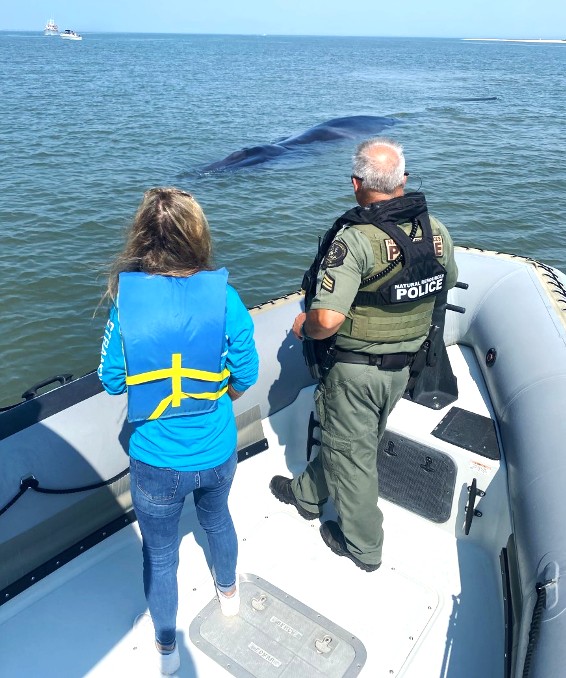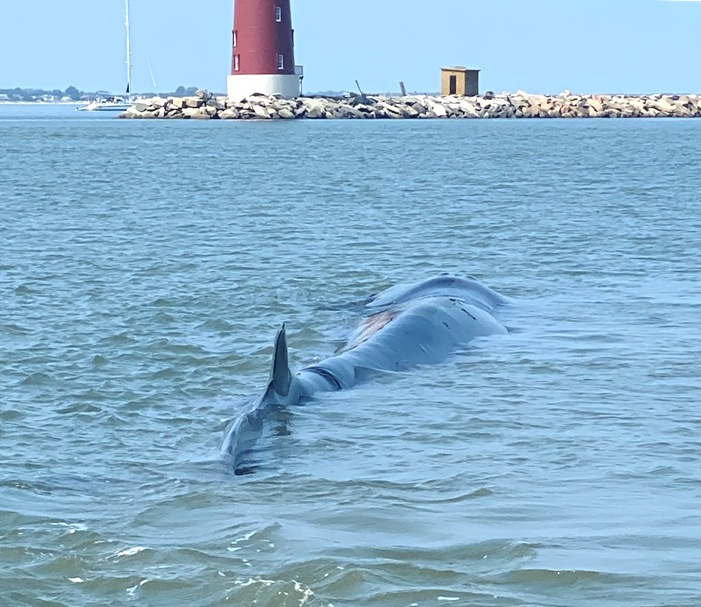UPDATED: Fin Whale Dies in Delaware Bay off Cape Henlopen, Officials Investigate and Bury Carcass

UPDATED 8/29/21 – Despite best efforts to assist the 57’ young male fin whale that stranded on a sandbar on the
bayside of the Point at Cape Henlopen State Park, the whale ultimately beached itself for the
final time on the oceanside of the Point on the evening of Thursday, August 26th. The whale
died on its own the following day, when respirations seemed to cease. Staff and volunteers
from the MERR Institute and Virginia Aquarium had made plans to provide palliative care,
sedation, and possibly euthanasia, but those plans turned out to be unnecessary as the whale
stopped breathing at around 12:00 p.m. just as the medical supplies and equipment arrived.
A necropsy was performed later that day, and preliminary findings confirmed that this was
indeed a debilitated animal suffering from underlying conditions. Examination of the whale by
the necropsy team revealed significant parasitic infections in the liver, lungs, and kidneys. The
thin body condition and empty stomachs suggest the whale had been impaired and not feeding
recently. Vessel trauma consistent with a propeller and skeg interaction was present on the back
of the animal, however, the injury was small and showed evidence of healing, suggesting it was
unrelated to the cause of stranding.
The whale was buried on the beach in the evening by the Shoreline and Waterways
Management team from DNREC.
MERR would like to thank everyone for their help and concern during this stranding event. We
appreciate all of the reports from the boaters and beachgoers who first alerted us to the
distressed whale, which enabled us to mobilize our response to get to it as soon as possible in
hopes that we could help it. We were assisted in this effort by several divisions of DNREC,
including the Natural Resources Police who spent many hours out on the water with us as we
tried to assess the whale’s condition, and the rangers and other personnel at Cape Henlopen
State park for their role in helping to secure the area once the animal became beached. And of
course, the staff from the Shoreline and Waterways Management section who provided the
heavy equipment and operator expertise that is so essential to moving a large whale that
weighs multiple tons. We greatly appreciate the support we received from NOAA and the
Virginia Aquarium stranding team as we worked together to care for this animal in the most
humane way possible.
The public can report strandings in Delaware to MERR at 302-228-5029.
==================================================
UPDATED 8/28 – The 58 foot long young adult male fin whale that stranded off The Point at Cape Henlopen State Park Thursday died Friday. The body was moved to the beach and a necropsy was done to give researchers better understanding of the whale’s life – and death – and why it died – initial observations point to parasites. . Members of the Virginia Aquarium Stranding Team were on hand as well as about 20 members of the MERR Institute who were assisting the team as well as officials from DNREC. The whale has been buried.
=====================================================================
Multiple agencies assisted the MERR Institute today in trying to rescue a fin whale that stranded itself on a sandbar on the bayside of The Point at the Cape Henlopen State Park near Lewes.
MERR responders were taken to the scene with the assistance of the Delaware Natural Resources Police to get a closer look at the whale and evaluate it for injuries or entanglement.

Since the initial observations, the whale moved off the sandbar and closer to shore, rather than into deeper water, which is not a good sign, says Rob Rector, one of the MERR volunteers. The whale appeared to be struggling and was in the process of beaching itself, he pointed out. Biologists are standing by to monitor the animal and NOAA is working with stranding network partners in the region to develop a response plan which includes options for palliative care, sedation, or euthanasia.
“At this time,” Rector said, “we do not know what has caused this whale to strand, but when large whales come close to shore like this, there is usually an underlying reason like injury or disease.” He says that the team on the scene has not identified any obvious injuries. “Sadly, in situations like this,” Rector explained, “there is often very little we can do to help save the whale. Returning the whale to deeper water — which is a challenge under the best of circumstances for animals of this size and weight — would only prolong its suffering and it would likely strand again.”

Fin whales are the second-largest whales on earth, after blue whales. They are listed as endangered throughout their range and are more commonly found in deep waters.


